Convening Details
15-17 October 2023
Protea Hotel by Marriott® Cape Town Waterfront Breakwater Lodge
About the Collaborative
We are an African health-focused collaborative dedicated to creating jobs through boosting youth employability, sustainable development, and enhancing primary healthcare ecosystems in Africa, by Africans, for Africans.
Vision: 3 million youth skilled to work in Africa’s health sector.
Our transformative partnership is anchored in Africa and builds on networks that already exist on the continent and beyond. Together, we are committed to prioritizing local, indigenous knowledge and expertise to create a strong foundation that cultivates self-sustaining communities and meaningful impact.
Convening Theme:
Our symbol represents the three pillars of Africa Health Collaborative (employment, ecosystem, and entrepreneurship) bonded together to illustrate the spirit of collaboration. Inspired by the Adinkra symbol Mpatapo, and the many patterns throughout all of Africa, this motif seeks to show unity by intertwining these knowledge circles. Separate yet together, this entwinement brings harmony and ultimately enlightenment, as shown through the outer radiating triangles.
This is the first of our many Convenings on the Continent, open only to the Health Collaborative partner institutions and attendance is by invitation only. We look forward to seeing you in Cape Town in October!
Pillars
The Health Collaborative identified three key pillars and enablers. The three pillars and programs are aligned to the Mastercard Foundation’s Health Strategy and partner institutional priorities and strengths.
HEMP pillar goal: Expand capacity to train primary health care workers to meet growing demand.
HENT pillar goal: Implement and sustain entrepreneurial ecosystems that launch health start-ups, generate revenue, and create meaningful employment.
HECO pillar goal: Train professionals across a broad range of disciplines critical for sustainable and equitable health-sector growth.
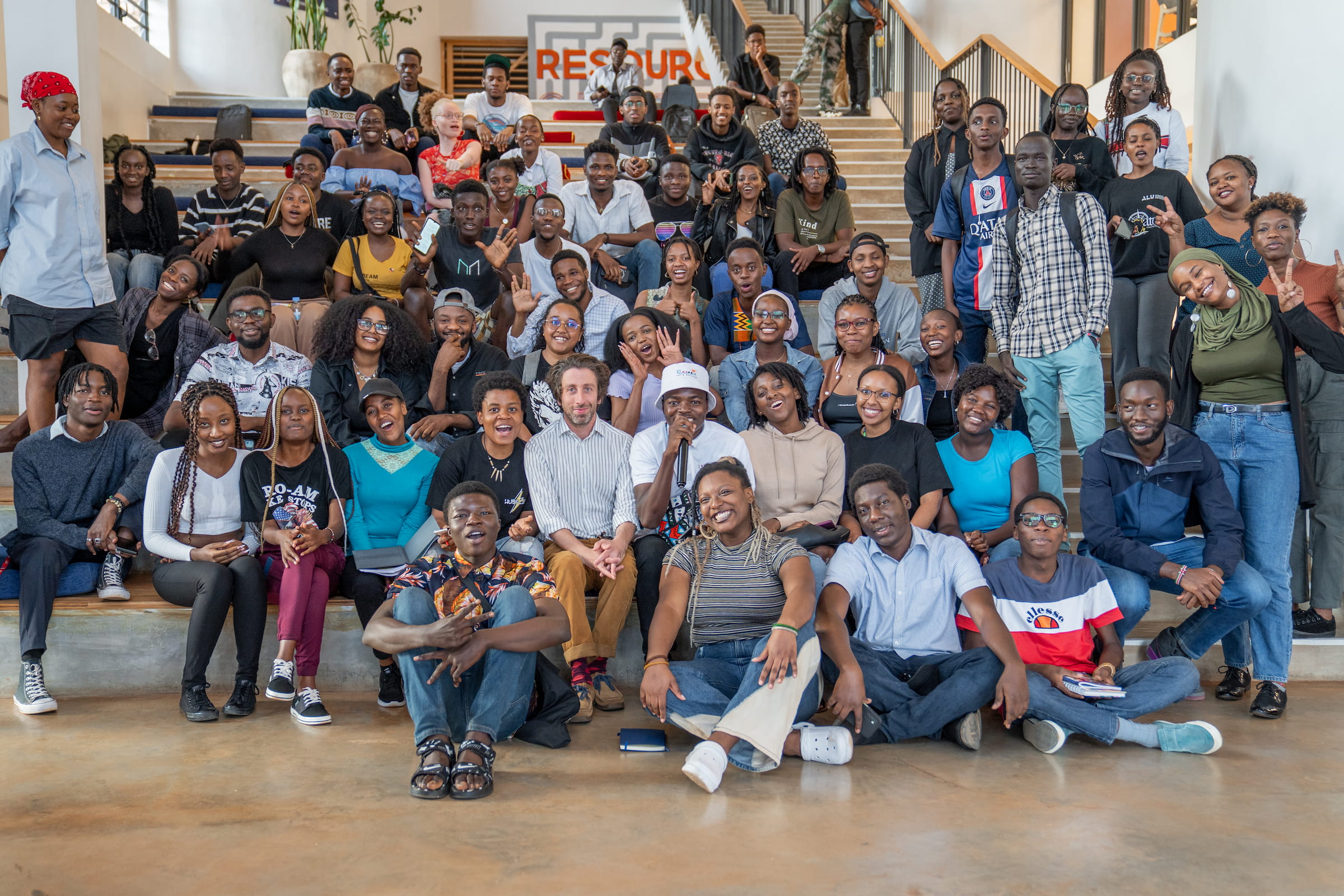
Our Partners
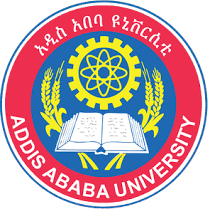

Addis Ababa University
Addis Ababa University (AAU), which was established in 1950 as the University College of Addis Ababa (UCAA), is the oldest and the largest higher learning and research institution in Ethiopia. Since its inception, the University has been the leading center in teaching-learning, research and community services.
Beginning with enrollment capacity of 33 students in 1950, AAU now has 47,610 students and 8,709 staff. In its 14 campuses, the University runs 70 undergraduate and 293 graduate programs, and various specializations in Health Sciences. Over 222,000 students have graduated from AAU since its establishment.
Addis Ababa University’s mission is to produce competent graduates, provide need-based community service and produce problem-solving research outputs through innovative and creative education, research and consultancy service to foster social and economic development of the country. The University is proud to be included as one of 9 partner institutions in the Africa Health Collaborative.

African Leadership University
Higher Education for a higher purpose: We believe that young people hold the potential to become the ethical, entrepreneurial leaders our continent and planet need. Our role is to unlock that potential through a one-of-a-kind learning experience that gives students the foundation for a lifetime of leading positive change. ALU approaches education through “Missions, not Majors”: with a keen focus on the Global Challenges – especially health-related Missions (in the entrepreneurial and ecosystems). Guided by learning coaches, visiting faculty, experts in residence and mentors, students undertake an immersive learning journey close to the problems they will need to solve as leaders and the communities they will serve. Learners get to identify a mission based on challenges or opportunities they have identified (or have lived with), and, they are given the foundational skills to lead themselves through (for example) an in-depth exploration of Values, Vision and Virtue. Through international internships and networking opportunities, learners also have access to significant resources (across the African Leadership Group and its partners) to research, prototype, conduct market assessment and scale their solutions in and outside of their communities. Over 41 nationalities are currently represented in ALU – on our main campus, and multiple hubs spread across different parts of the world and growing. We run undergraduate programs in Software Engineering and Entrepreneurial Leadership, an Executive MBA and other leadership programs. ALU, Doing Hard Things!
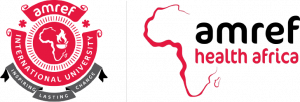

Amref International University / Amref Heath Africa
Amref International University (AMIU) was established in 2017 as a Premier Pan African University of health sciences fully owned by Amref health Africa. AMIU is founded on the experience and intellect of Amref Health Africa, which is reputed with over 60 years of quality and innovative public and community health interventions in over 30 countries in Africa. With this work, the need to train health workers in communities was evident and the response was short tenure training courses by the Amref Training Centre (AITC) and later the Directorate of Capacity Building (DCB), the predecessor of AMIU. These Amref training programmes run for over 40 years have produced alumni spread throughout the world who have created the name recognition, reputation and brand that Amref is today. It was then evident that there was a need to train people who would occupy higher levels thus influence health policy, regulation and legislation. The University was thus established.
AMIU’s focus is on training, research and extension in health sciences with emphasis on promotive, preventive, rehabilitative and palliative health. Its commitment is to progressively develop innovative programmes catering to the present as well as future Africa and global health needs. The University offers postgraduate, undergraduate, higher diploma, diploma, certificate programmes as well as Continuing Professional Development (CPD) courses that prepare human resource for health to serve throughout the health system. AMIU seeks to train transformation leaders who will Inspire Lasting Change.


Ashesi University
Ashesi University Foundation was founded by Dr. Patrick Awuah, and spearheaded (till date) by a well-qualified Board of Trustees whose efforts are complemented by Advisory Boards located in the US and Ghana. In 2002, Ashesi University officially launched its liberal-arts style of higher education as a private, not-for-profit, non-sectarian institution fitting to Africa’s context and enrolled its pioneering class of 30 students. Ashesi University’s mission is to propel an African renaissance by educating ethical, entrepreneurial leaders. Located in Berekuso, Ghana, this private, non-profit university combines a rigorous multidisciplinary core as part of its four-year undergraduate program with major studies in Computer Science, Management Information Systems, Engineering and Business Administration, as well as graduate programs in Mechatronics Engineering. A student-led honour code, integrated community service, diverse internships, and real-world projects prepare Ashesi students to develop innovative solutions for the challenges facing their individual communities, countries and the continent at large. As of January 2023, Ashesi University had an undergraduate student population of 1,418 and 40 post graduate students, of which 47% are women and 46% are on scholarships.
Ashesi is now recognized as one of the finest universities in Africa, with a proven track record in fostering ethical leadership, critical thinking, an entrepreneurial mindset, and the ability to solve complex problems. And in 2018, the President of Ghana granted Ashesi a Charter to operate as a fully autonomous institution; no longer to be supervised by a public university under Ghana’s accreditation system. Ashesi is the youngest university to have achieved such recognition, and one of five private universities in Ghana to have a Charter.
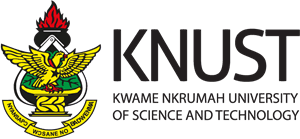

Kwame Nkrumah University of Science and Technology
Kwame Nkrumah University of Science and Technology (KNUST) was established in 1951 as Kumasi College of Technology. It was officially opened on January 22, 1952 with 200 teacher training students transferred from Achimota College. In October 1952, the School of Engineering and the Department of Commerce were established.
In 1953, a Pharmacy Department was established, and a Department of Agriculture was opened to provide courses for the Ministry of Agriculture. A Department of General Studies was also instituted to prepare students for Higher School Certificate Examinations.
In 1957, the School of Architecture, Town Planning and Building was inaugurated, and its first students were admitted in January 1958. As the college expanded, it was decided to make KNUST a purely science and technology institution. In pursuit of this policy, the Teacher Training College was transferred to Winneba Training College and the Commerce Department was transferred to Achimota.
KNUST is now a leading university in Ghana and offers a wide range of courses in science, technology, engineering, and the humanities. It is a major contributor to the economic and social development of Ghana.
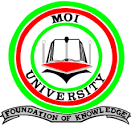

Moi University
Moi University was founded in 1984 by an act of parliament (Moi university Act, 1984) as the second public University in Kenya and is one of the top ranked public universities in Kenya. It is located Uasin Gishu county, Kesses, 35 kilometers from Eldoret town, 310 kilometers Northwest of Nairobi the capital city of Kenya. Since its inception, the University has experienced phenomenal growth leading to establishment of several constituent colleges most of which have since grown into fully fledged universities namely; Maseno University, Masinde Muliro University of Science & Technology (MMUST), Maasai Mara University (Mmaarau), University of Kabianga (UoK), University of Eldoret (UoE), Karatina University, Rongo University, Garissa University and Alupe University. It currently has four campuses; Main Campus (Kesses), Nairobi Campus, Coast Campus and Eldoret Town campus. It has one constituent college; Bomet University College. Moi University serves a student population of 39,786 both undergraduate and postgraduate via onsite and offsite 233-degree programmes across the fifteen schools of the institution. It has a staff component of 3,000 of both faculty and administrative staff. The school of Public Health is situated in the Eldoret Town campus; College of Health Sciences. Moi University serves as one of the 8 African Partner institutions for the African Higher Education Health collaborative.

University of Cape Town
The University of Cape Town is a community of exceptionally talented students, teachers and researchers – and a wide range of professional, administrative support and service staff – all of whom are committed to help change this world for the better. We encourage one another to work hard, not only to earn degrees or public recognition, but also to be leaders in this increasingly changing world.
Our vision is to be an inclusive, research-intensive African university that addresses the challenges of our time with cutting-edge teaching, research and facilities. As a university we are committed to promoting transformation, to working tirelessly to guarantee the sustainability of our institution, and to ensuring excellence in all we do.
UCT has a proud tradition of academic excellence and is currently the top-rated university in Africa and one of the top-rated universities in the world.
Our researchers continue to help with the creation of African-based solutions to global problems, including issues relating to climate change, urbanization, safety and security, education and health, to name just a few. Many UCT researchers are recognized world leaders in their respective fields.
The UCT Faculty of Health Sciences is the most research intensive faculty in the university, with postgraduate students outnumbering undergraduates, and a world rating among the top 50 health sciences faculties worldwide (by Times Higher Education). The Faculty has 13 academic departments, over twenty multi-disciplinary research groupings, and more than 4000 students.
The AfreHE-HCo@UCT programme will be hosted within the Faculty of Health Sciences, by the Department of Family, Community and Emergency Care, abbreviated to ‘FaCE’. It consists of five divisions: Family Medicine, Primary Health Care, Emergency Medicine, Integrated Palliative Care and Medicine, and Sports and Exercise Medicine.
The massive transformative purpose of FaCE is “to build inclusive communities of care together”, referring not only to external geographic communities and partners in Cape Town and the Western Cape province, but also to communities of staff and students internal to UCT, as well as international partners. This is the connection between the Higher Education Health Collaborative and the aspirations and goals of the University of Cape Town.
University of Toronto
Founded in 1827, University of Toronto is one of the world’s top ranking research-intensive universities and is spread out across 3 campuses; St. George, Mississauga and Scarborough. Ranked as #1 in Canada, and among the top ten public universities worldwide, the University of Toronto is home to over 90k students, and 16k faculty, and has 11 accelerators and is recognized as one of the top five university business incubators in the world by UBI Global in its latest world benchmark study. The University is located in the heart of Toronto and has 21 affiliated hospitals, and 600 plus industry partners worldwide. The University of Toronto serves as the Secretariat for the Africa Health Collaborative, a network of 8 African Partner Institutions, the University of Toronto and the Mastercard Foundation.
Program Schedule
This is a draft program schedule, tentative to change.
Building the partnership
Registration
Pre-Meetings
Closed meetings for members only:
- Health Employment (HEMP) Pillar Meeting (Breakaway Room 4)
- Health Entrepreneurship (HENT) Pillar Meeting (Breakaway Room 5)
- Health Ecosystem (HECO) Pillar Meeting (Breakaway Room 6)
- Executive Steering Committee meeting (Solution Space)
- Event Organising Committee (Auditorium)
Youth breakfast engagement with MCF Scholars speaking to MCF on challenges and opportunities for youth unemployment, youth entrepreneurship, health and wellbeing.
Location: Conference Foyer
Facilitators:
Dr. Edwina Apaw
Program Manager, International Relations (Africa), University of Toronto
Her PhD research at the University of Reading’s Henley Business School highlights how Indigenous knowledge is utilized by African entrepreneurs in various industries, specifically in the Ashanti Region of Ghana. She was one of several entrepreneurs, government officials and institutional leaders to engage in a recent online event that explored how to forge stronger economic relationships between Africa and Canada through entrepreneurship.
Dr Dancan Irungu
Dean Graduate School and Director of Enterprises at Amref International University
He is a scholar and an expert in Entrepreneurship, Corporate Strategy, Organizational Development (OD), and Project Management. He has been a member of a think tank, technical advisor, and lead consultant for projects funded by GoK, World Bank, Global Fund, UNDP, USAID, and the European Union. Dr Irungu has a passion for social and economic empowerment and the transformation of the youth of Africa through enterprise development. He holds a Bachelor of Education (BED) (Business & Mathematics), a Master of Art in Project Management and Planning, and a Doctorate in Business Administration and Management. He is a scholar and an expert in Entrepreneurship, Corporate Strategy, Organizational Development (OD), and Project Management.
Note: Attendees not involved in any of these meeting can make informal networking arrangements
Session 1: Official Welcome
Location: Auditorium
Session Chair:
Associate Professor Lionel-Green Thompson
Dean of Faculty of Health Sciences, University of Cape Town
Associate Professor Lionel Green-Thompson was appointed dean and took up the role from 15 March 2020. He is currently the chair of the network for Medical Education in Resource Constrained Situations. In 2019 he was nominated to the board of directors of the network Towards Unity for Health.
Welcome Tea
Welcome to the Africa Higher Education Higher Health
Collaborative Convening 2023!
Chief Bradley van Sitters (Danab ǁHui !Gaeb di !Huni!nâ !Gûkhoeb)
The head of the Language Commission of the |Xarra Restorative Justice Council based at the Centre for African Studies also the director of the Khoekhoegowab Curriculum Review Committee
Community historian, oral researcher, endangered language campaigner and practitioner of localized ritual archives. The very first ever San-Khoi Imbongi to usher the President at the State of the Nation Address. In 2019 has been acknowledged by UNESCO as the Year of International Indigenous Languages. This is also the year where University of Cape Town made history by becoming the first and only University in South Africa, to offer Khoekhoegowab (Khoikhoi language) as a field of study in South Africa. Chief Bradley was appointed as the formal language facilitator of the programme has been truly empowering through co-designing a decolonial pedagogy in the process of producing knowledge.
Professor Daya Reddy
Emeritus Professor, Interim Vice-Chancellor, University of Cape Town (UCT)
Prof Reddy has served as head of the Department of Applied Mathematics; and as dean of the Faculty of Science. He was elected by the Senate to serve three terms on the Council, the governing body of the university. He also served as an acting deputy vice-chancellor over three periods, for a total of over two years.
Dr Saadiq Kariem
Chief Operating Officer, Western Cape Government – Department of Health
Dr Kariem is a medical doctor, a Public Health Physician and a Fellow of the has an Executive Masters in Business Administration (EMBA). Dr Kariem previously served as a member of the President’s National AIDS Council task team for HIV prevention and has sat on the Networking HIV & AIDS Community of Southern Africa (NACOSA) board since its inception.
Session 2: What is Our Why?
Location: Auditorium
Session Chair:
A/Prof Tracey Naledi
Deputy Dean: Social Accountability and Health Systems and Associate Professor in Public Health Medicine, Faculty of Health Sciences, University of Cape Town
A/Prof Naledi is the Founding Chairperson of Tekano, Health Equity for South Africa and is the current chair of the Event Organising Committee for the Africa Health Collaborative Convening, Cape Town 2023.
Aim: To gain insights on the challenges that this Health collaborative is addressing.
Keynote: Empowering youth for a healthy future: Exploring social innovation and change levers in African health systems.
Presenter:
Prof Laetitia Rispel
Deputy Dean: Social Accountability and Health Systems and Associate Professor in Public Health Medicine, Faculty of Health Sciences, University of Cape Town
She holds a SARChI Chair, entitled Research on the Health Workforce for Equity and Quality and a “B” NRF rated researcher. She has extensive and wide-ranging experience of research, teaching, and health leadership in different settings. She is a former Head of the Wits School of Public Health and a former Head of the Gauteng Provincial Government Department of Health.
Q&A (15 mins)
Panel discussion: Youth entrepreneurship to address unemployment and improve health and wellbeing. (45 mins)
Panel Chair:
Dr Solange Rosa
Director of the Bertha Centre for Social Innovation and Entrepreneurship, UCT
She serves as Associate Faculty and Adviser with the Allan Gray Centre for Values-based Leadership and teaches on Executive Education and MBA programmes at the UCT Graduate School of Business and the UCT School of Economics. Dr Rosa is head of the Western Cape Government’s Policy and Strategy Unit
Panellists:
Dr Nhlanhla Msomi
Chair of AfricaBio
He holds a BSc (Honours) in Molecular Genetics in Biotechnology (Sussex University (UK), a PhD (Genetic Engineering) (UKZN), a Diploma in Management Accounting & Finance (Varsity College), and International Executive Development Program (Wits Business School).
Dr Christelle Giraneza
(Youth) Co-Founder and Director of Public Relations, URUKUNDO Initiative
She is a sexual and reproductive health and rights (SRHR) advocate and community activist. In her current role with URUKUNDO Initiative, a youth-led social enterprise making SRHR information available through games, she is in charge of public relations and overall implementation as the co-founder. She is also currently working for a youth-led organization, Rwanda Village Community Promoters, as a volunteer and a SRHR activist.
Dr Paul Santere
Professor & Baxter Chair in Health Technology & Commercialization (UHN), University of Toronto
He is an engineer qualified in the area biomaterials design for blood contacting systems. In March 2010 he received the Julia Levy Award from the Canadian Society for Chemical Industry for translation of knowledge to product. In 2012 he was the recipient of the Natural Sciences and Engineering Research Council of Canada (NSERC) Synergy Award recognizing outstanding contributions to technology transfer activities with Industry.
Prof Steve Reid
Professor of Primary Health Care, UCT.
He is a Family Physician with extensive experience in clinical practice, education and research in the field of rural health in South Africa. He is the Chair of the Primary Health Care and the Head of Department of Family, Community and Emergency Care in the Faculty of Health Sciences, UCT.
Lunch
Session 3: How do we work together for impact?
Location: Auditorium
Session chair:
Prof Sue Harrison
Deputy Vice-Chancellor for Research and Internationalisation, UCT
Her portfolio includes advancing the research quality, quantity and impact across the university, enhancing UCT’s African agenda, internationalization and research partnerships, growing and transforming the postgraduate sector and oversight of interdisciplinary university research institutes. She has a BSc majoring in Chemistry and Microbiology, UCT, BSc Honours in Microbiology, UCT, and a PhD (Chemical Engineering), Cambridge University.
Aim: To frame and establish the guiding principles that will govern the health collaborative
A creative partnership in higher education: TAAAC (20 mins)
Presenters:
Dr Dawit Wondimagegn
Former Chief Executive Director of the College of Health Sciences (CHS), Vice President of Addis Ababa University (AAU), Associate Professor of Psychiatry (AAU), Ethiopian Director of Toronto Ababa Academic Collaboration (TAAAC)
He has published in the areas of global mental health, family medicine, medical ethics, psychotherapy knowledge translation, and post-partum depression.
Prof Clare Pain
Founder and Senior Strategist of TAAAC & Professor, Department of Psychiatry, University of Toronto
In 2014, she was awarded an honorary doctorate for assisting the development of psychiatry in Ethiopia. Her clinical focus is the assessment and treatment of individuals including refugees. She has lectured and taught on various aspects of psychological trauma and global mental health.
Q & A (10 mins)
Fireside Chat with Foundation and members of Executive Steering Committee on principles of partnership in the collaborative (30 mins)
Facilitator:
Prof Kwame Norvixoxo
Lecturer, African Leadership University
He is currently a Lecturer (designing, teaching and evaluating Research) at the African Leadership University, as well as the Director and Senior Consultant for Knorx Consulting Services. His other roles in African Leadership University (ALU) include, Capstone Manager for the Global Challenges Faculty, Research Committee Chair for ALU, Head of Ethics and Research Faculty Lead.
Panellists:
Prof Joe Wong
Vice-President, International, University of Toronto
He was the Ralph and Roz Halbert Professor of Innovation at the Munk School of Global Affairs & Public Policy up until June 2023. He previously held the Canada Research Chair in Democratization, Health and Development for two full terms, ending 2016. In 2017, Professor Wong was appointed Associate Vice-President and Vice-Provost of the University of Toronto, overseeing international student experience. His research interests are in comparative public policy and political economy.
Prof Angela Owusu-Ansah
Professor & Provost, Ashesi University
She brings more than thirty years of experience in education in Africa and the United States; and is a member of the Phi Kappa Phi education honour society. She’s an activist for higher education quality serving on national university accreditation agency Boards such as the Ghana Tertiary Education Council (GTEC) and served 18 years on the United States Council for Accreditation of Educator Preparation.
Dr Peter Materu
Chief Program Officer, Mastercard Foundation
He brings a strategic perspective to the Education and Learning and Youth Livelihoods teams at the Foundation. He has made major contributions to education in Africa. Before joining the Foundation, Peter was the Practice Manager for Education in West and Central Africa at the World Bank. He conceived the Africa Centres of Excellence initiative, which is advancing STEM education in multiple African universities across the continent.
Q&A: 15 mins
Official signing of the guiding principles of the Collaborative
Facilitator:
Gwen Burrows
Assistant Vice President, International Engagement and Impact, University of Toronto
She came to the University from The Hospital for Sick Children, where she held a number of leadership positions, including Executive Director, Public Affairs and Child Health Advocacy. As Director, Strategic Projects for the SickKids Research Institute from 2006-2013, amongst other accomplishments she co-led a successful Canada Foundation for Innovation grant proposal and its implementation to support the vision guiding the development of the Peter Gilligan Centre for Research and Learning.
Unwind, Network, Explore: Informal Connections
Informal Networking
Travel to Kirstenbosch Gardens
Networking opportunities while walking in the garden:
- Students mobility and Indigenous Medicine (AAU and
Moi); - Deepening Impact in rural areas through CHW (UCT and
Amref); - Developing the PHDs (UofT, AAU, KNUST),
- Deepening impact through policy level (AAU, Moi,
KNUST)
Session 4: Welcome Dinner and Showcase: Welcome Dinner and Showcase of Scholar innovations
Location: Moyo’s Kirstenbosch Gardens
Aim: To connect over dinner while showcasing the Health Collaborative scholar innovations
Showcasing Youth Entrepreneurs innovations
Facilitator(s):
Dr Solange Rosa
Director of the Bertha Centre for Social Innovation and Entrepreneurship, UCT
She serves as Associate Faculty and Adviser with the Allan Gray Centre for Values-based Leadership and teaches on Executive Education and MBA programmes at the UCT Graduate School of Business and the UCT School of Economics. Dr Rosa is head of the Western Cape Government’s Policy and Strategy Unit
Dave Fenton
Assistant Director, External Relations, UTSC Management, University of Toronto
He is currently pursuing a Master of Education in Leadership, Higher and Adult Education at the Ontario Institute for Studies in Education at the University of Toronto. He is also an alumnus of the University of Toronto earning an Honours Bachelor of Arts. Dave joined the University of Toronto Scarborough Community in 2016, bringing over 10 years of experience as a corporate account manager and territory sales manager for start-ups in the medical technology field.
Entertainment
Travel back to Protea Hotel
Insights From Our Context and Our Community
Youth breakfast: Follow–up discussions with the Foundation
and Executive Steering Committee
Facilitators:
Dr. Edwina Apaw
Program Manager, International Relations (Africa), University of Toronto
Her PhD research at the University of Reading’s Henley Business School highlights how Indigenous knowledge is utilized by African entrepreneurs in various industries, specifically in the Ashanti Region of Ghana. She was one of several entrepreneurs, government officials and institutional leaders to engage in a recent online event that explored how to forge stronger economic relationships between Africa and Canada through entrepreneurship.
Dr Dancan Irungu
Dean Graduate School and Director of Enterprises at Amref International University
He is a scholar and an expert in Entrepreneurship, Corporate Strategy, Organizational Development (OD), and Project Management. He has been a member of a think tank, technical advisor, and lead consultant for projects funded by GoK, World Bank, Global Fund, UNDP, USAID, and the European Union. Dr Irungu has a passion for social and economic empowerment and the transformation of the youth of Africa through enterprise development. He holds a Bachelor of Education (BED) (Business & Mathematics), a Master of Art in Project Management and Planning, and a Doctorate in Business Administration and Management. He is a scholar and an expert in Entrepreneurship, Corporate Strategy, Organizational Development (OD), and Project Management.
Location: Conference Foyer
Session 5: Insights from our context and our community
Location: Auditorium
Session chair:
Dr Kofi Akohene Mensah
Senior lecturer at the Department of Health Policy, Management and Economics, School of Public health, Kwame Nkrumah University of Science and Technology
Public Health Specialist with rich experience in health services management and public health policy.
Plenary Reflections: The aim is for collective reflection from the
previous day to gain insights on opportunities for the health
collaborative.
- Day 1 Recap (15mins)
- Youth Engagement report back (30 mins)
Facilitator:
Dr Princess Ruhama Acheampong
International / Industrial Liaison Officer, Kwame Nkrumah University of Science and Technology
Dr Princess Ruhama Acheampong is a Lecturer at the School of Public Health of the Kwame Nkrumah University of Science and Technology (KNUST), Ghana. She teaches both undergraduate and postgraduate students in Health Promotion, Public Health Nutrition, Community Health and Social and Behavioural Change Communication courses. Princess has been involved in research in malaria, Epidemiology, maternal and child health, public health nutrition, health interventions.
Q&A (15mins)
Collaborative’s Needs Assessment Study Feedback: Capacity of the health collaborative to respond to challenges and opportunities to address youth unemployment, health and wellbeing.
(40 mins)
Yvonne Opanga
Research, Learning, and Impact Technical Advisor at Amref Health Africa and Adjunct Faculty at the Amref International University, School of Public Health
She is the secretary of the Amref Ethics and Scientific Review Committee, where she coordinates the activities of the IRB secretariat. She is a public health researcher with more than 12 years’ experience in implementation research, Impact evaluations, health systems research, and Bioethics. She has a keen interest in research that addresses emerging trends across the health system continuum in the context of Primary Healthcare.
Q&A (15 mins)
Briefing: Parallel Sessions
Tea BREAK
Session 6: Deeper insights into the programme pillars
Session Chair:
Prof Joachim Osur
Professor and Vice Chancellor, Amref International University is a Professor of Public Health as well as a Sexual and Reproductive Health practitioner
He is the Vice Chancellor, Amref International University. He is a leader with wide experience in building sustainable health systems in Africa. He is also a specialist in higher education with a focus in building fit for purpose health workforce for African health systems. He is a medical practitioner specialized in Sexual Medicine and continues to attend to patients in his line of specialization.
Parallel Sessions:
HEMP: Africa’s Health Workforce Strategy: Why and How we must collaborate towards Universal Health Coverage
Presenter:
Dr Nhlanhla Msomi
Chair of AfricaBio
He holds a BSc (Honours) in Molecular Genetics in Biotechnology (Sussex University (UK), a PhD (Genetic Engineering) (UKZN), a Diploma in Management Accounting & Finance (Varsity College), and International Executive Development Program (Wits Business School).
Location: Breakaway 4
HENT: Factors influencing the future of entrepreneurship and how do we all get there together
Presenter:
Dr Diane Uyoga
Moi University
She has previously served as the head of department of Aviation Management and Operations. She has extensive training and teaching experience in both quantitative and qualitative research designs and has published on quantitative research approaches in Kenya. She has served in the university at the capacity of knowledge integration and transfer in the fields of research, marketing, management and aviation.
Dr Solange Rosa
Director of the Bertha Centre for Social Innovation and Entrepreneurship, UCT
She serves as Associate Faculty and Adviser with the Allan Gray Centre for Values-based Leadership and teaches on Executive Education and MBA programmes at the UCT Graduate School of Business and the UCT School of Economics. Dr Rosa is head of the Western Cape Government’s Policy and Strategy Unit
Dr Sena Agbodjah
Senior Lecturer, Department of Business Administration, Ashesi
She is a senior lecturer and serves as the head of the business administration department at Ashesi University. She teaches in the areas of entrepreneurship and project management. She holds a BSc. and PhD in Building Technology from the Kwame Nkrumah University of Science and Technology (KNUST) and is a Project Management Professional.
Location: Breakaway 5
Health Ecosystem: Understanding Health Ecosystems Challenges in Africa
Presenter:
Dr Emmanuel Tenkorang
Medical Doctor and Senior Public Health Specialist
He is currently the Regional Director of Health Services of the Ashanti Region, Ghana. Dr. Tinkorang holds a Master of Public Health and an MBChB from the University of Ghana. He is a Fellow of Ghana College of Physician (FGCP) (Public Health) and Clinical Fellow of Joana Briggs Institute (CFJBI) University of Adelaide South Australia. He was awarded by the government of Ghana (order of volta) for his strategic leadership in the fight against Covid-19.
Location: Breakaway 6
Feedback from each Parallel sessions 10 mins presentation (30mins)
- HEMP (10mins)
- HENT (10mins)
- HECO (10mins)
Q&A 30min
Location: Auditorium
Session 7: Insights from Community Site Visit
Site visit logistics
Travel to 5 groups of Community visits
Lunch on the move
5 Site visits
Capacity: 44 pax
The UCT GSB Solution Space is an ecosystem for high-impact early-start-ups, corporate innovation, and entrepreneurship development & research. The Philippi Hub, a satellite hub in the community of Philippi, offers community engagement to inspire socially-driven innovations.
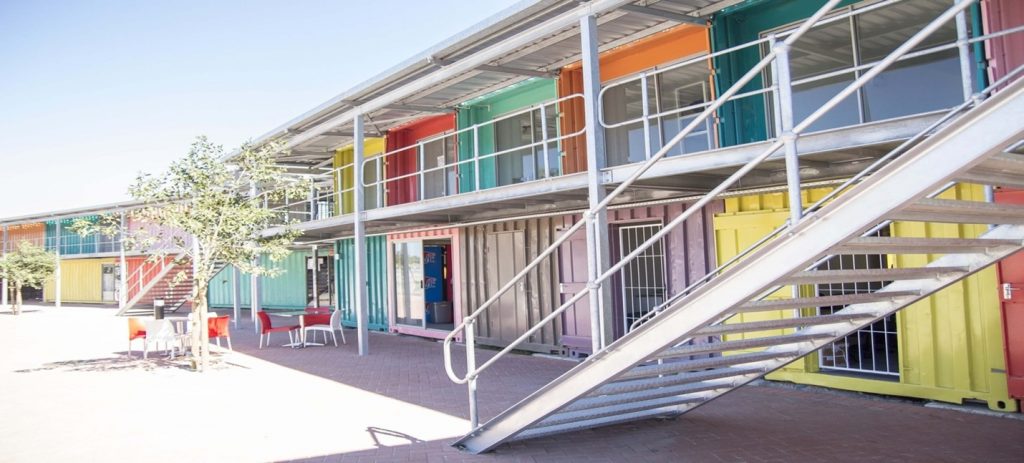
Capacity: 22 pax
The Faculty of Health Sciences opened its first “purpose-built” student learning centre in 2005 in the nearby Bonteheuwel community. This Vanguard Student Learning Centre is an extension to the Vanguard Community Health Centre that serves the neighbouring communities of Bonteheuwel and Langa. The facility has 10 consulting rooms, patient waiting areas, a computer room, a seminar room, and a courtyard where students and patients can relax. The centre is also fully equipped for medical consultations, as well as physiotherapy and speech and language therapy.
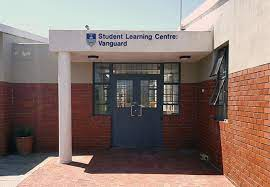
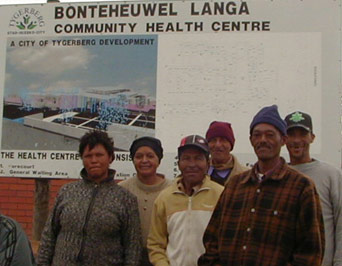
Capacity: 22 Pax
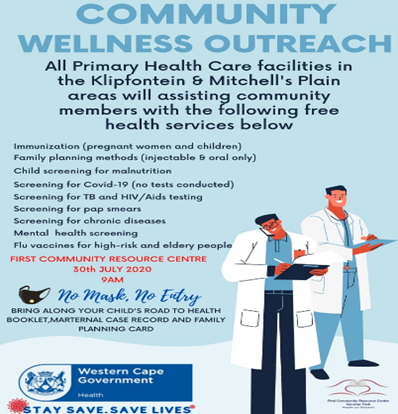
Hanover Park CHC is a Primary Health Care Facility that serves the Greater Athlone population of Klipfontein Sub district. The facility attends to approximately eight hundred (800) patients per day, three thousand five hundred (3 500) per week and fifteen thousand (15 000) per month. The department employs one hundred and twenty-three (123) staff members at this facility.
Capacity: 22 pax
Victoria Hospital is a District Hospital in the Southern and Western Sub Structure in the Metro. Victoria Hospital is also a teaching institution that’s well known for its excellence. As a District Hospital it offers students and interns a perfect balance of expert supervision and hands-on clinical training. This hospital also has a community based palliative care organization unit called Abundant Life. The hospital and unit provide holistic care including medical, psychosocial and spiritual support for patients living with a terminal disease.
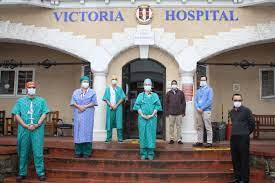
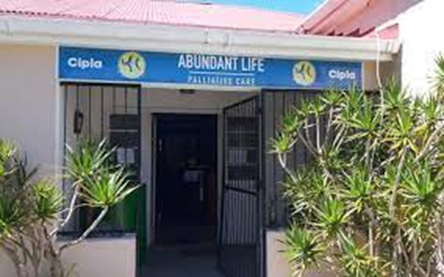
Capacity: 22 pax
The first public services Healthcare Innovation Hub in Africa, the GSH Healthcare Innovation Hub is a partnership between the Bertha Centre for Social Innovation and Entrepreneurship, based at the Graduate School of Business, UCT’s Faculty of Health Sciences (FHS), Groote Schuur Hospital (GSH), the GSH Facilities Board, and the Western Cape Provincial Department of Health.
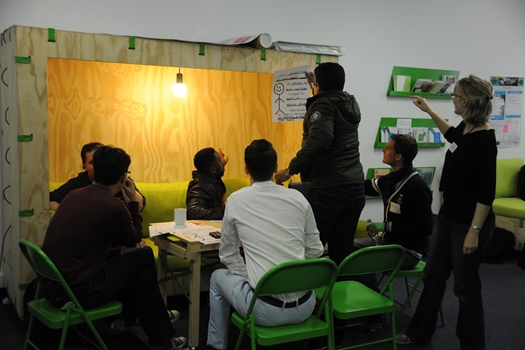
Travel Back to Protea Hotel
Reset and Informal networking
Session 8: Insights from each of the Collaborative partners
Location: Conference Foyer
Session Chair:
Joseph Ndiritu
Associate Director, Programs Delivery and Reporting, African Institute for Mathematical Sciences (AIMS)
A Development, Programme Management, and Evaluation professional with 15 years of success in implementing strategies that drive the partner’s missions & visions and advocate for the interests of the disadvantaged in society. Graduate of the Thunderbird School of Global Management.
Aim: To get to know the health collaborative institutions and the work that they do and some of their ideas for programmes in the health collaborative
- Poster Presentation Showcase
- Cocktail Soiree
- Connections Session
Where to From Here
Session 9: Insights from our community visits
Location: Auditorium
Session Co-chairs:
Dr Sena Agbodjah
Senior Lecturer, Department of Business Administration, Ashesi
She is a senior lecturer and serves as the head of the business administration department at Ashesi University. She teaches in the areas of entrepreneurship and project management. She holds a BSc. and PhD in Building Technology from the Kwame Nkrumah University of Science and Technology (KNUST) and is a Project Management Professional.
William Annoh
Assistant Director, Prof. Adei Studio for Research Excellence, Ashesi University
Assistant Director, The Professor Adei Studio for Research Excellence at Ashesi University in the Office of Academic Affairs at Ashesi University, providing research and scholarship support to faculty under the leadership of the Provost (Chief Academic Officer). He is a Management & Information Systems graduate from Ashesi University in Ghana, with a diploma in International Finance from the IE Business School in Madrid, Spain, & an MSc in Business & Management from the University of Essex.
Reflections from site visits: to curate lessons and insights from
our context and community and what they mean for the health
collaborative.
10 min presentation from each site (50 mins)
Q&A: 30 mins
Tea Break
Session 10: A Session of Commitment, Celebration, and Convergence
Location: Auditorium
Session Co-chairs:
A/Prof Tracey Naledi
Deputy Dean: Social Accountability and Health Systems and Associate Professor in Public Health Medicine, Faculty of Health Sciences, University of Cape Town
A/Prof Naledi is the Founding Chairperson of Tekano, Health Equity for South Africa and is the current chair of the Event Organising Committee for the Africa Health Collaborative Convening, Cape Town 2023.
Prof Wilberforce Owusu Ansah
Associate Professor, Department of Marketing and Corporate Strategy KNUST
He is an accomplished researcher, lecturer, trainer and consultant in Entrepreneurship and Small Business Management, Public Policy, Public Health, and Immigrant Entrepreneurship. He has worked in private, public and not-for-profit organizations and academic institutions throughout the world including Norway, The Netherlands, Ireland and his native Ghana in many and varied capacities. He is a former Head of Department of the Marketing and Corporate Strategy Department and also a former Vice Dean of the KNUST School of Business.
Looking Ahead: Partner Reflections and Commitments
Facilitators:
Dr Penina Lam
Senior Director, International Relations (Africa), University of Cape Town
Senior higher education executive with over 20 years of international experiences across Africa, Canada, and the US. She is an experienced scholar-practitioner with advanced skills managing people-, projects- and programs across sectors. I have dedicated my entire career to advocating for inclusive learning and development opportunities for ALL (from classrooms – to team rooms – to boardrooms).
Dr Dancan Irungu
Dean Graduate School and Director of Enterprises at Amref International University
He is a scholar and an expert in Entrepreneurship, Corporate Strategy, Organizational Development (OD), and Project Management. He has been a member of a think tank, technical advisor, and lead consultant for projects funded by GoK, World Bank, Global Fund, UNDP, USAID, and the European Union. Dr Irungu has a passion for social and economic empowerment and the transformation of the youth of Africa through enterprise development. He holds a Bachelor of Education (BED) (Business & Mathematics), a Master of Art in Project Management and Planning, and a Doctorate in Business Administration and Management. He is a scholar and an expert in Entrepreneurship, Corporate Strategy, Organizational Development (OD), and Project Management.
Participant Appreciation Awards
Facilitators:
Eva Boakye-Yiadom
Project Manager of the Mastercard Foundation Africa Health Collaborative, Kwame Nkrumah University of Science and Technology (KNUST)
Eva has great expertise in administration, audit, accounting, and project management. Eva is a PhD candidate at the KNUST School of Business. She holds an MSc in Accounting and Finance from Christian Service University, Kumasi Ghana, Masters in Business Administration, from the Oxford Brookes University, Oxford, United Kingdom and Bachelor of Management Studies from KNUST.
Sheila Chepkirui
Administrative Assistant, Moi University, School of Public Health
She has a passion for education and every aspect around it particularly biased towards higher education; postgraduate studies. Currently pursuing a Masters in Education Research. Her research interests center around experiences of postgraduate students and timely completion of their studies and effective management strategies of cultivating academic excellence in higher learning institutions. Through her research, she aims to contribute to the ongoing improvement of educational institutions and their ability to prepare future leaders and scholars.
Evaluation: Convening Review
Facilitators:
Dr Timothy Kinoti
Learning Facilitator, Africa, University of Toronto
He is a Certified European Investment Bank-Global Development Network Fellow in Development Finance. He is also a seasoned Social and Economic Analyst, collaborating closely with Development Actors in the Civil Society and Social Impact Investors from NGO and Public sectors. Throughout my career, I have concentrated on supporting marginalised and displaced communities in areas such as Education, Health, and Economic Empowerment.
JesusMiracle Chiadika
Regional Lead, International Research Officer, UofT
Closing ceremony: Handover from UCT to KNUST
Prof Sue Harrison
Deputy Vice-Chancellor for Research and Internationalisation, UCT
Her portfolio includes advancing the research quality, quantity and impact across the university, enhancing UCT’s African agenda, internationalization and research partnerships, growing and transforming the postgraduate sector and oversight of interdisciplinary university research institutes. She has a BSc majoring in Chemistry and Microbiology, UCT, BSc Honours in Microbiology, UCT, and a PhD (Chemical Engineering), Cambridge University.
Prof Ellis Owusu
Dabo, Pro Vice-Chancellor, KNUST
He is a Consultant Public Health Physician, University Teacher and Researcher. As a Professor of Epidemiology and Global Health, his area of expertise is in Medical Epidemiology and applied public health technologies. He has PhD in epidemiology and public health from the University of Nottingham, UK. His research interest is in mainly non-communicable diseases in low-income country settings and also has considerable interest in population genomics of pulmonary tuberculosis
Closing remarks: Prof Ellis Owusu – Dabo, Pro Vice-Chancellor, KNUST
Entertainment
Lunch and Departure
Monitoring, Evaluation, Learning & Adaptation (MELA)
Co-creation Workshop for the Africa Health Collaborative (HC)
Date: Thursday 12 and Friday 13 October 2023
Place: Protea Hotel by Marriott® Cape Town Waterfront Breakwater Lodge
Room: Boardroom 1
Contact: Angel Motsamai
Phone: +27 83 993 0397 (WhatsApp)
Facilitators: Southern Hemisphere
Workshop objectives: By the end of this workshop, the Health Collaborative partners will:
- explore how their specific interventions are contributing to the overall change in Africa’s Primary Health Care (PHC).
- define HC goals, outcomes, and establish pathways and measures of success (indicators).
- present and discuss the MasterCard Foundation’s Impact Strategy and principles of engagement for MELA for the Collaborative.
- co-create an evaluation, research, and learning agenda to support and facilitate collaboration work amongst the partners.
- ensure women, Internally Displaced Persons (IDPs) and refugees are considered in the MELA framework.
- inform the external evaluator’s Terms of Reference (ToR) for an evaluation, research and learning agenda and identify roles and responsibilities.
- develop a shared language and understanding of the Collaborative’s MELA approach.
12 October: Defining Success
Registration and settle in
University of Toronto
Set-up: Welcome, introductions, expectations
Southern Hemisphere
Setting the scene: orientation from Mastercard Foundation’s Impact Strategy & and University of Toronto MELA
Mastercard Foundation and University of Toronto
Break
Theory of Change (ToC): Constructing a ToC for the Health Collaborative: Goal, outcomes, and pathways of change
Southern Hemisphere
Lunch Break
Energizer
Southern Hemisphere
ToC: Pathways of change continued
Southern Hemisphere
ToC: Mapping interventions of the Health Collaborative
Southern Hemisphere
Tea Break
ToC: Assumptions for the program design
Southern Hemisphere
Closure
Southern Hemisphere
13 October: Setting an evaluation, research, and learning agenda
Ice breaker and open window
Southern Hemisphere
ToC: Measures of change
Southern Hemisphere
TEA BREAK
ToC: Measures of change
Southern Hemisphere
Setting the evaluation, research, and learning agenda
Southern Hemisphere
LUNCH
Mastercard Foundation’s approach to executing learning agenda
Southern Hemisphere
Co-creating the research and learning process for sharing and adaptation
Southern Hemisphere
TEA BREAK
Co-creating the research and learning process for sharing and adaptation
Southern Hemisphere and University of Toronto
Overview of Health Collaborative’s Principles & Values
Gwen Burrows, University of Toronto
Next steps for the Health Collaborative & photographs
Southern Hemisphere
Review of the day and reflections
- Addis Ababa University
- African Institute for Mathematical Sciences (AIMS)
- Africa Leadership University
- Amref International University / Amref Health Africa
- Ashesi University
- Kwame Nkrumah University of Science and Technology
- Mastercard Foundation
- Moi University
- University of Cape Town
- University of Toronto